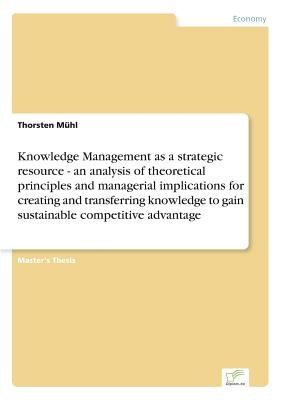
- We will send in 10–14 business days.
- Author: Thorsten Mühl
- Publisher: Diplom.de
- Year: 2003
- Pages: 148
- ISBN-10: 3838662563
- ISBN-13: 9783838662565
- Format: 14.8 x 21 x 0.9 cm, softcover
- Language: English
- SAVE -10% with code: EXTRA
Knowledge Management as a strategic resource - an analysis of theoretical principles and managerial implications for creating and transferring knowledge to gain sustainable competitive advantage (e-book) (used book) | bookbook.eu
Reviews
Description
Inhaltsangabe: Abstract: With the beginning of the 1990s, the knowledge era arrived and virtually no organisation can afford to neglect a thorough and methodical discussion on the idea of "managing knowledge". The importance and the prominent role knowledge plays today cannot be overemphasised. As we shall see later on, knowledge and the ability to leverage it provides a comprehensive source of competitive advantage. Keeping this idea in mind the subsequent research project is structured in three main parts. The first part provides an introduction into the field of knowledge. General ideas will be explained, definitions and rationalisations shall be provided. Part two is designed to examine the two central columns of knowledge management: the creation and the transfer of knowledge. In order to analyse both subjects in an entire, comprehensive way, the subsequent dissertation outlines differences and similarities between the two most prominent methodologies: the Anglo-Saxon and the Japanese approach. Within the third part it is intended to combine theoretical findings and pragmatic insights (although the whole paper is for the most part of theoretical nature, cf. research methodology) to develop managerial implications for knowledge management. To be precise, what are the prerequisites of knowledge management? In order to further develop the methodological approach, I structured the part in four points that I consider as the unconditional, complete preconditions for effective knowledge management: culture, HR issues, strategy, and process. The four issues ought to build the foundation for every successful knowledge management initiative. To underline theoretical results the appendix provides two case studies (Siemens and IBM Global Service) as well as a practical guide for measuring knowledge (from the American Productivity and Quality Centre). Generally speaking, the subject matter knowledge management is of profound interest within the discipline of strat
EXTRA 10 % discount with code: EXTRA
The promotion ends in 20d.00:19:18
The discount code is valid when purchasing from 10 €. Discounts do not stack.
- Author: Thorsten Mühl
- Publisher: Diplom.de
- Year: 2003
- Pages: 148
- ISBN-10: 3838662563
- ISBN-13: 9783838662565
- Format: 14.8 x 21 x 0.9 cm, softcover
- Language: English English
Inhaltsangabe: Abstract: With the beginning of the 1990s, the knowledge era arrived and virtually no organisation can afford to neglect a thorough and methodical discussion on the idea of "managing knowledge". The importance and the prominent role knowledge plays today cannot be overemphasised. As we shall see later on, knowledge and the ability to leverage it provides a comprehensive source of competitive advantage. Keeping this idea in mind the subsequent research project is structured in three main parts. The first part provides an introduction into the field of knowledge. General ideas will be explained, definitions and rationalisations shall be provided. Part two is designed to examine the two central columns of knowledge management: the creation and the transfer of knowledge. In order to analyse both subjects in an entire, comprehensive way, the subsequent dissertation outlines differences and similarities between the two most prominent methodologies: the Anglo-Saxon and the Japanese approach. Within the third part it is intended to combine theoretical findings and pragmatic insights (although the whole paper is for the most part of theoretical nature, cf. research methodology) to develop managerial implications for knowledge management. To be precise, what are the prerequisites of knowledge management? In order to further develop the methodological approach, I structured the part in four points that I consider as the unconditional, complete preconditions for effective knowledge management: culture, HR issues, strategy, and process. The four issues ought to build the foundation for every successful knowledge management initiative. To underline theoretical results the appendix provides two case studies (Siemens and IBM Global Service) as well as a practical guide for measuring knowledge (from the American Productivity and Quality Centre). Generally speaking, the subject matter knowledge management is of profound interest within the discipline of strat


Reviews